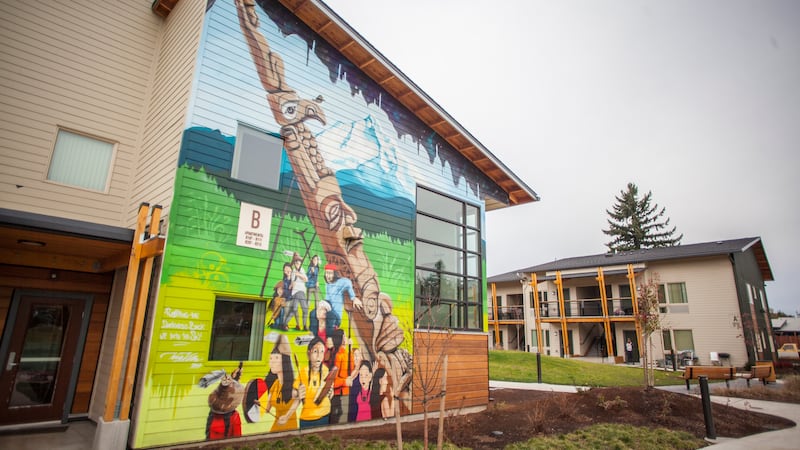In February, the city's top housing officials gathered in Southeast Portland's Lents neighborhood to celebrate a project that promised to meet a significant need for Native Americans.
The $11.5 million, 40-unit affordable housing complex called NAYA Generations was built with more than $10 million in public funds to address a systemic ill: More than 1 in 5 Native American children in Multnomah County lived in foster care, according to a 2011 study.
In response, the Native American Youth and Family Center, which goes by the acronym NAYA, pledged to build a community for foster families with elders living on-site to support them. Ten apartments would be set aside for foster families, and another 30 units would go to seniors.
"It will be a model project ensuring the success of Native children currently in foster care," said Rey España, NAYA's then-director of community development, in a 2014 promotional video still on the NAYA website.
But the results don't match those promises.
NAYA Generations currently doesn't house a single foster family, says Guardian Real Estate Services, the project's property manager. And only seven of the 40 households include seniors age 55 and older.
Guardian's president says NAYA simply failed to recruit enough foster families and senior citizens.
"They didn't fulfill that part of the deal," says Tom Brenneke, president of Guardian. "Somebody needed to be engaged with the Native American community and with the foster system."
As the city of Portland prepares to spend more than $250 million with an affordable housing bond, NAYA Generations presents a cautionary tale about good intentions.
Portland housing officials are increasingly focused on addressing historical injustices with their policies. The city, for example, has said it plans to spend the bond with a goal of serving people of color. In addition, the city is spending more than $50 million in North and Northeast Portland to encourage the return of Portlanders, many of them black, who were pushed out of those gentrified neighborhoods years ago.
But the failure of NAYA Generations to reach its own benchmarks raises questions about how well the city monitors the nonprofits it uses to build housing.
City Commissioner Dan Saltzman, who oversaw the Housing Bureau when it approved funding for the project, says he's troubled that NAYA has fallen so far short of what it proposed.
"It's disappointing to me in the extreme," he says. "I believe sponsors of the project should be held accountable."
Mayor Ted Wheeler says the city should reassess how it watchdogs nonprofits. "If our partners do not or cannot hold themselves accountable for delivering the program they promised," he tells WW, "then we have to."
NAYA Generations was based on a similar, successful housing development: Bridge Meadows, which opened in 2011 in North Portland. Seniors and families adopting children out of foster care live side by side: 25 foster children and 28 seniors moved in within the first nine months of the project's opening, according to the Bridge Meadows nonprofit.
Funding for NAYA Generations included federal low-income tax credits worth $8.7 million; $600,000 from the Housing Bureau; and free lease of the property on the site of a former school.
When Portland Housing Bureau officials awarded $600,000 in funding, they also trumpeted the project's goals: "permanent supportive housing with 30 units for seniors and 10 units for families with children," they wrote in a 2014 press release.
A year later, Meyer Memorial Trust awarded $525,000 to the project using similar criteria.
But NAYA says finding foster families and elders who met the requirements to live there—incomes for a family of four of less than $44,820 a year, with no significant criminal history and no evictions in the past year—proved difficult.
NAYA executive director Paul Lumley also cites federal housing laws.
"NAYA did not expect that fair housing laws would be as constraining and inflexible with regard to implementation as it turns out they are," he says. "This was coupled with the complexity of Native families with difficult backgrounds who just could not get their applications approved. We found the application and lease-up process frustrating and made even more difficult by the holidays and prolonged extreme winter weather."
One family at NAYA Generations is in the process of trying to become foster parents, according to Guardian. Children in two other households were previously in foster care and have reunited with their families at NAYA Generations.
The Portland Housing Bureau has no way to penalize NAYA for not keeping its promises—because the only requirement the city put in writing was that Generations would serve low-income people.
"Our regulatory agreement on this project is specific to the rent/income restrictions and financial performance," says Housing Bureau spokeswoman Martha Calhoon.
The Meyer Trust says such problems with grant awards are not uncommon.
"Our expectation is that grantees are transparent with both successes and challenges," says Candy Solovjovs, director of programs at Meyer.
News that NAYA did not end up serving the population it had hoped is just the latest problem with the project.
NAYA last year abandoned plans for a second phase of development for the site: a longhouse-style community center, built in cooperation with the school district. NAYA could not raise the $3 million for its contribution to the longhouse's costs as the organization struggled financially and the leadership of NAYA changed.
NAYA nevertheless defends what it has achieved with the project: 48 percent of the residents identify at least partly as Native American, and 78 percent are people of color.
"While we have not yet met our goals," Lumley says, "we are providing the kind of low-income housing relief for the Portland area that is in dire need."
